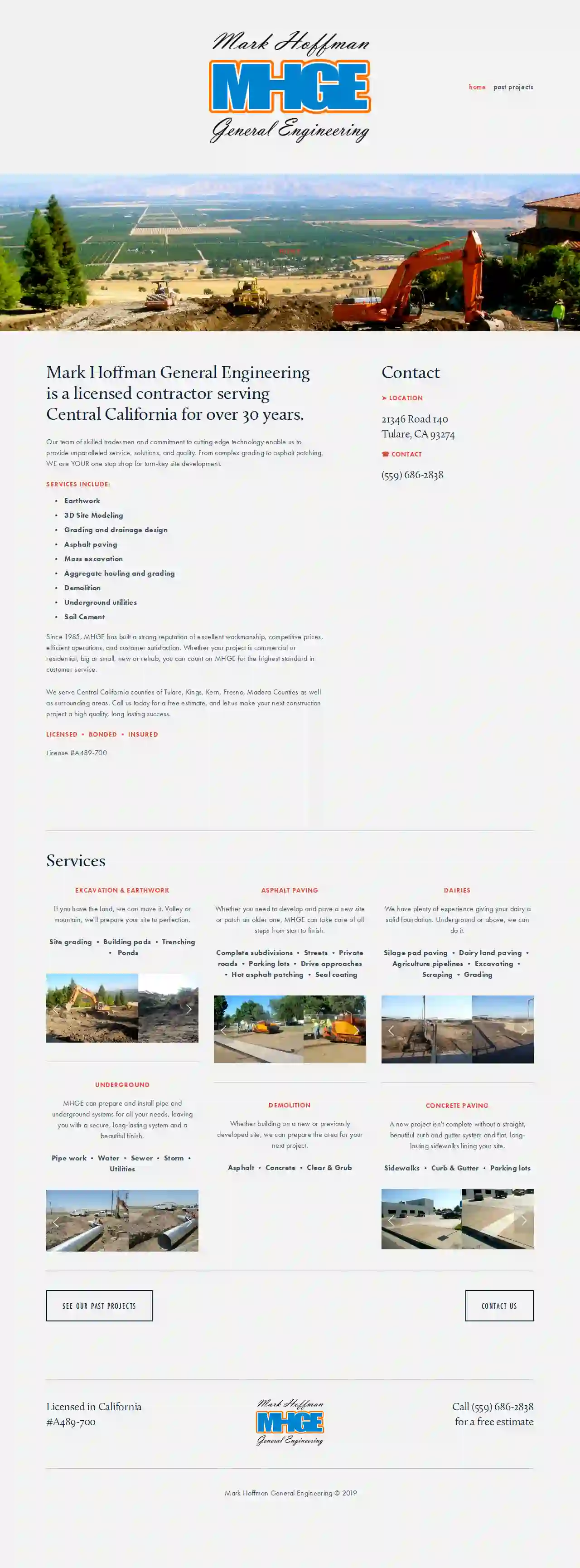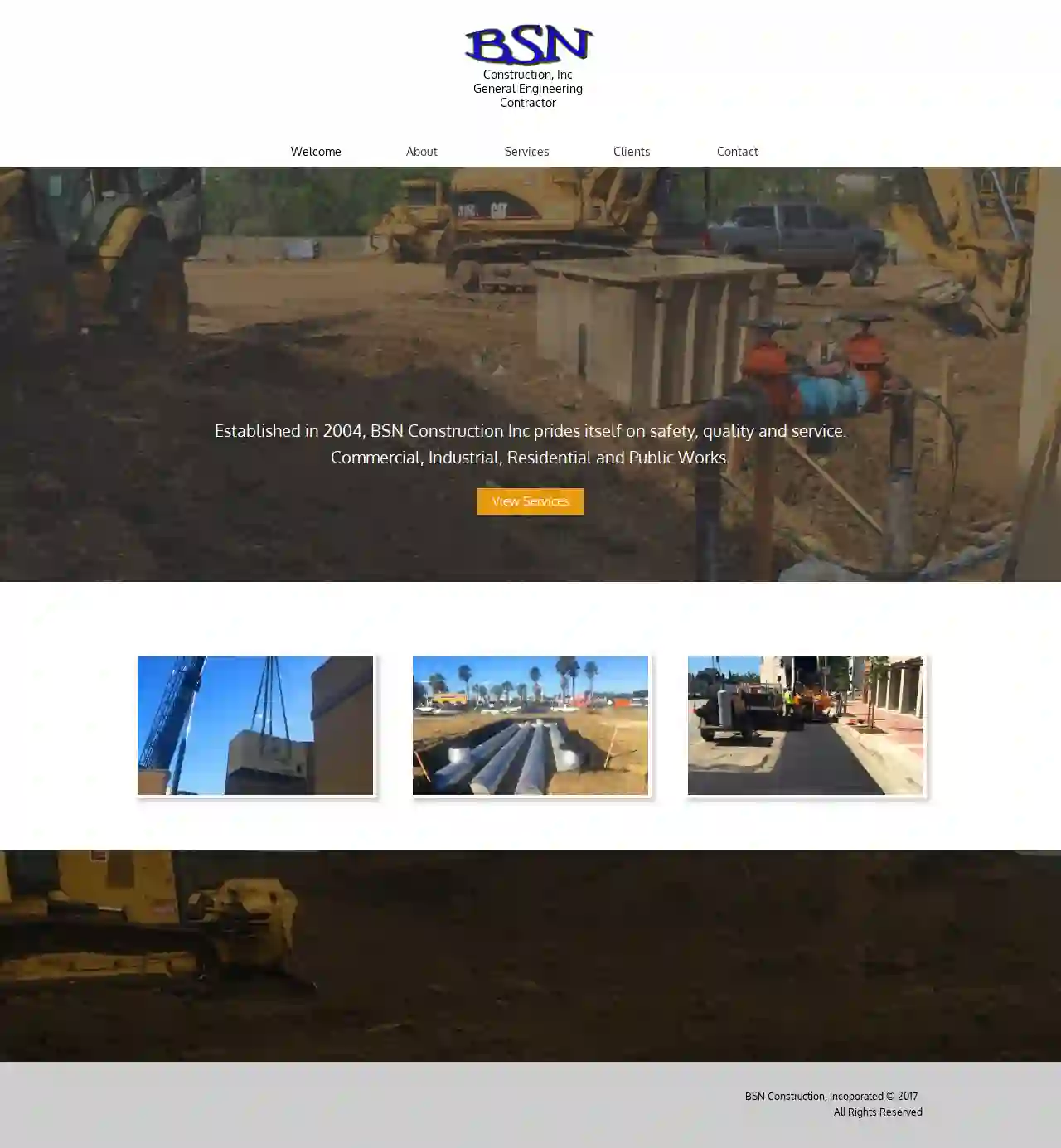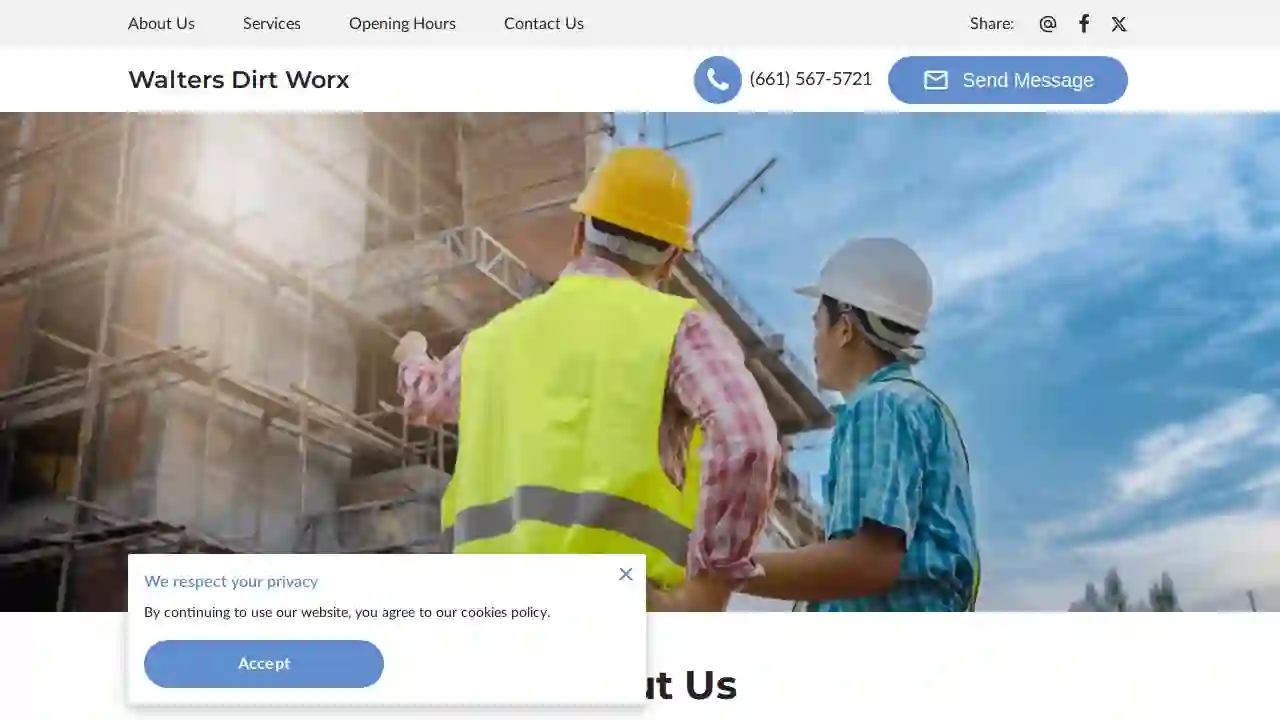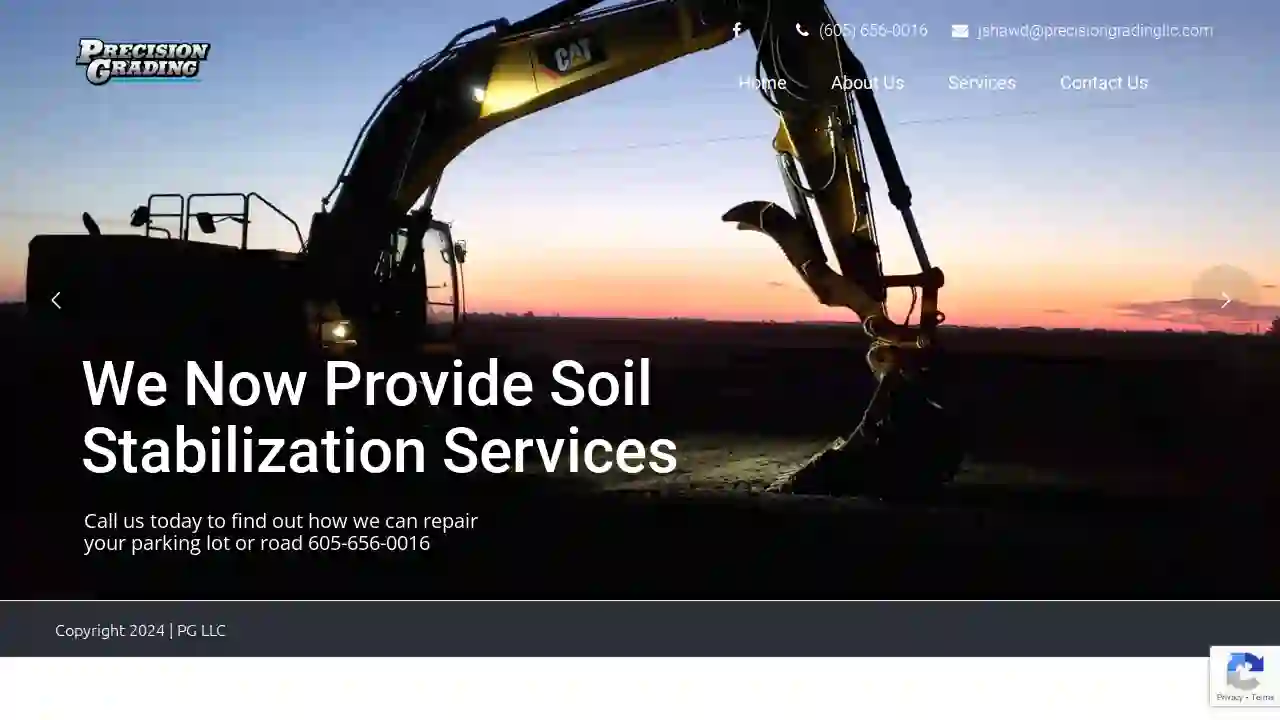Demolition Contractors Salinas
Best Demolition Services in Salinas
Receive 3 FREE Demo Companies quotes for your project today! Compare profiles, reviews, accreditations, portfolio, etc... and choose the best service.

Mark Hoffman General Engineering
121346 Road 140, Tulare, 93274, USMark Hoffman General Engineering Mark Hoffman General Engineering is a licensed contractor serving Central California for over 30 years. Our team of skilled tradesmen and commitment to cutting-edge technology enable us to provide unparalleled service, solutions, and quality. From complex grading to asphalt patching, we are your one-stop shop for turn-key site development. Since 1985, MHGE has built a strong reputation for excellent workmanship, competitive prices, efficient operations, and customer satisfaction. Whether your project is commercial or residential, big or small, new or rehab, you can count on MHGE for the highest standard in customer service. We serve Central California counties of Tulare, Kings, Kern, Fresno, Madera Counties as well as surrounding areas. Call us today for a free estimate, and let us make your next construction project a high-quality, long-lasting success. Licensed • Bonded • Insured License #A489-700
- Services
- Why Us?
- Gallery
Get Quote
BSN CONSTRUCTION, INC
1Suite 200, 1000 Old Country Rd, Garden City, 11747, USBSN Construction: Your Trusted Partner for Quality Construction BSN Construction is a family-owned and operated business with over 20 years of experience in the construction industry. We are committed to providing our clients with the highest quality construction services at competitive prices. We specialize in a wide range of construction projects, including residential, commercial, and industrial. We are also a licensed and insured contractor, so you can rest assured that your project is in good hands. We understand that building or renovating your home or business is a big decision. That's why we take the time to listen to our clients' needs and work with them to develop a plan that meets their specific requirements. We are also committed to providing excellent customer service and keeping our clients informed throughout the entire construction process. If you are looking for a reliable and experienced construction company, look no further than BSN Construction. We are confident that we can provide you with the quality construction services you need to make your project a success.
- Services
- Why Us?
Get Quote
Souza Construction & Electric
52 reviews586 So. Farmersville Blvd., Farmersville, 93223, USSouza Construction Inc. is a growing construction business, striving ever forward to become a premier general contractor. From our beginning as a “one-man show”, until our present state as a “multi-faceted” team, one thing has remained constant, a commitment to customer service. It is this commitment that has helped Souza Construction Inc. nearly double its sales every year for the last four years. We firmly believe that it will be this continuing commitment that will assist us in continuing this phenomenal growth pattern. Essential to this excellent service are our capabilities as a builder and a business. THE SOUZA COMMITMENT Souza Construction Inc. has committed itself to recruiting and training leaders in both the construction and professional world. Assembling a team of this caliber is not a quick or simple process, but requires diligent research, highly refined discernment, and continuous assessment. However, it is just this level of commitment and attention to detail that sets us apart. Souza Construction Inc. has made this our primary goal: understanding our customers and their needs, utilizing excellence in the field and in administration, and combining this with an unwavering commitment to customer satisfaction; this is Souza Construction Inc.
- Services
- Why Us?
- Testimonials
- Gallery
Get Quote
A-1 Septic Services
4.675 reviewsModesto, USThe Best Value in Septic Tank Services in Merced County, Stanislaus County, and San Joaquin County Since 1990 The Best Value in Grading & Excavating in Merced County, Stanislaus County, and San Joaquin County Since 1990 Best Choice for Portable Restroom Rentals in Merced County, Stanislaus County, & San Joaquin County Expert Septic Tank Services, Grading & Excavating in Modesto, Oakdale, Escalon & Surrounding Areas For the best septic tank installation and repair, septic tank pumping, utility trenching, and grading/excavation services in Merced County, Stanislaus County, and San Joaquin County, choose A-1 Septic and AAA Backhoe Service. For over 30 years, we've been the preferred septic tank company and excavator for thousands of general contractors, builders, commercial businesses, property managers, city agencies, homeowners, and real estate agents. They trust us because we consistently deliver high quality workmanship and personalized customer service at very competitive prices. Whether you need septic tank repair in Modesto, leach line additions in Ceres, or utility trenching in Salida, we have the skills, knowledge, and expertise to get the job done according to the highest industry standards. AAA Backhoe Service holds a Class A General Engineering Contractors License from the California State License Board, and has earned an A+ rating with the Better Business Bureau. We always use the industry's best practices to ensure that all work gets completed on time, in budget, and in accordance with county and city building codes.
- Services
- Why Us?
- Accreditations
- Testimonials
- Gallery
Get Quote
Excavating Contractor Los Angeles
59 reviewsLos Angeles, USWelcome to Bobcat Excavating Services Los Angeles As an excavation services and bobcat services provider in Los Angeles, we at BSLA – Bobcat Services Los Angeles help our clients with any processes that involve removal of earth from the ground, transfer of earth from one site to another, backfilling of earth to previously excavated spaces, and modification of sites to suite various clients’ needs. Are you building or remodeling your outdoor space? Chances are that we can be of help. If you searched for “excavators near me” for you got to the right place! We are experts when it comes to excavation, bobcat services, compacting, filling and grading. We work on residential sites, commercial sites, and industrial locations. We are licensed and insured and all our machine operators are vigorously skilled in handling our heavy machinery and providing precision results.
- Services
- Why Us?
- Gallery
Get Quote
Regier Construction Company
1PO Box 6084, Visalia, 93290, USOUR MISSION Quality and dependability are at the forefront of everything we do at Regier Construction. Our mission is for every one of our clients to experience transparency and top-notch customer service. Based in Visalia, California, and with over 13 years of industry experience we are pleased to offer commercial and residential services including, but not limited to, septic inspection, installation, and repair, excavation and grading, underground wet utilities, concrete, and more. We look forward to applying our expertise to your next project. General Engineering Contractor Lic. #1113926
- Services
- Why Us?
- Gallery
Get Quote
Walters Dirt Worx
1Bakersfield, California, USAbout Us Here at Walters Dirt Worx we offer an exceptional range of construction services in the greater Bakersfield area. From concrete foundation work to excavation, brickwork, and architectural advice, our experienced builders understand the best solutions that work for you. We provide any heavy equipment required work with outstanding results and unbeatable pricing. We’re all dedicated to our roles and work hard to get the job done. Give us a call at +16615675721 so we can discuss any of your construction needs. We always use the highest quality materials during the construction of your outdoor space and our expert designers utilise industry-leading tools. This mix of top equipment and unmatched skill has allowed us to succeed by supplying our clients with services they won’t forget. Not convinced? Think we’re all talk? Read our reviews and get in touch to see what we can deliver. You will not be disappointed. Are you putting together a blueprint for a property or building? If you are, we can deliver expert excavation services to prepare a new build for the foundations and basis of your construction. We understand the demands that are placed on you, so work with your goals in mind to prepare and excavate the land by the most efficient means possible, using a combination of manpower and highly technical heavy-duty vehicles.
- Services
- Why Us?
Get Quote
Land Clearing Group
55 reviewsOrange, USAbout The Land Clearing Group We help homeowners and businesses clear and prepare their property for the next phase of their project. Whether you need simple brush clearing or a total clear and site prep, we are here to help. Land Clearing Group is more than just a single company, we are composed of a large team of industry professionals that can handle any land clearing project; no matter the task. Our team of pros gives property owners a combined 50+ years of experience. We have worked in land projects across the state of Florida, Land Clearing Central Florida is quickly become the industry leader in customer satisfaction.Understand that this is our top priority on all land clearing solutions. Operating with such high corporate standards is not an easy task to achieve and can be solely attributed to the multiple professionals involved. Since the start of the company, we have operated on 3 principles which are visible on every project we do: We love this stuff! We will show up at each job: on time, ready to work and have fun. There will be crystal clear communication with the property owners at all times: before, during and after all projects. Your property will always be treated the same way we would treat our own property.
- Services
- Why Us?
- Gallery
Get Quote
Go Direct Paving
566 reviewsDavis, US- Services
- Why Us?
Get Quote
Precision Grading LLC
4.73 reviewsServing Eastern South Dakota in Mitchell, SD and Western South Dakota in Rapid City, Mitchell, USAbout Precision Grading LLC Precision Grading LLC is a professional grading and excavating contractor located in Eastern South Dakota. We specialize in providing high-quality GPS and Laser site development, grading, and excavation services to meet the needs of our clients. Our team is committed to delivering exceptional results, working closely with you to ensure your project is completed on time and within budget. We take pride in our attention to detail and our commitment to safety. Whether you need excavation for a new construction project, grading for a parking lot, or any other site development services, Precision Grading LLC has the experience and expertise to handle your project with precision and efficiency.
- Services
- Why Us?
- Gallery
Get Quote
Over 3,943+ Excavation Contractors onboarded
Our excavation experts operate in Salinas and beyond!
ExcavationHQ has curated and vetted Top Excavation Pros in and around Salinas. Find a reliable pro today.
Frequently Asked Questions About Demolition Contractors
- Dust Suppression: Use water spraying, misting systems, or other dust suppression techniques to control airborne particles.
- Noise Barriers: Erect temporary noise barriers around the demolition site to reduce noise transmission to nearby properties.
- Work Schedule: Schedule noisy demolition activities during permitted hours to minimize disturbance to neighbors.
- Communication: Keep neighbors informed about the demolition schedule and any potential disruptions.
- Experience: Look for companies with a proven track record and years of experience in the demolition industry.
- Licensing and Insurance: Ensure the contractor is properly licensed to operate in your area and carries adequate insurance to protect you from liability.
- Safety Record: Inquire about their safety protocols and accident history. A reputable contractor prioritizes safety.
- References and Reviews: Ask for references from past clients and check online reviews to gauge their reputation and customer satisfaction.
- Professionalism: Choose a company that communicates clearly, provides detailed estimates, and has a courteous and responsive team.
- 'Can I see proof of your licensing and insurance?' Verify their credentials and coverage.
- 'What experience do you have with projects like mine?' Ensure they have relevant expertise.
- 'Can you provide references from past clients?' Check their reputation and customer satisfaction.
- 'What are your safety protocols?' Prioritize contractors who emphasize safety.
- 'How will you handle hazardous materials?' Ensure they have proper procedures for asbestos or lead abatement.
- 'What is your timeline for completing the project?' Understand the project duration.
- 'How will you manage noise, dust, and debris?' Discuss mitigation measures for minimizing disruption.
- 'What are your payment terms?' Clarify payment schedules and any required deposits.
Can I do demolition myself?
How can I minimize the dust and noise from demolition?
How do I find a reputable demolition contractor?
What questions should I ask a demolition contractor before hiring them?
Can I do demolition myself?
How can I minimize the dust and noise from demolition?
- Dust Suppression: Use water spraying, misting systems, or other dust suppression techniques to control airborne particles.
- Noise Barriers: Erect temporary noise barriers around the demolition site to reduce noise transmission to nearby properties.
- Work Schedule: Schedule noisy demolition activities during permitted hours to minimize disturbance to neighbors.
- Communication: Keep neighbors informed about the demolition schedule and any potential disruptions.
How do I find a reputable demolition contractor?
- Experience: Look for companies with a proven track record and years of experience in the demolition industry.
- Licensing and Insurance: Ensure the contractor is properly licensed to operate in your area and carries adequate insurance to protect you from liability.
- Safety Record: Inquire about their safety protocols and accident history. A reputable contractor prioritizes safety.
- References and Reviews: Ask for references from past clients and check online reviews to gauge their reputation and customer satisfaction.
- Professionalism: Choose a company that communicates clearly, provides detailed estimates, and has a courteous and responsive team.
What questions should I ask a demolition contractor before hiring them?
- 'Can I see proof of your licensing and insurance?' Verify their credentials and coverage.
- 'What experience do you have with projects like mine?' Ensure they have relevant expertise.
- 'Can you provide references from past clients?' Check their reputation and customer satisfaction.
- 'What are your safety protocols?' Prioritize contractors who emphasize safety.
- 'How will you handle hazardous materials?' Ensure they have proper procedures for asbestos or lead abatement.
- 'What is your timeline for completing the project?' Understand the project duration.
- 'How will you manage noise, dust, and debris?' Discuss mitigation measures for minimizing disruption.
- 'What are your payment terms?' Clarify payment schedules and any required deposits.